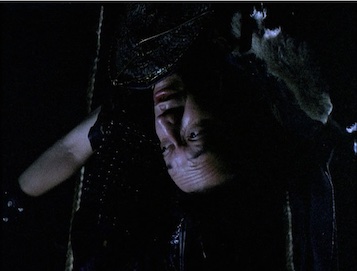
An important part of canon in Xena, Hercules, & Young Hercules is the use of Greek myth, cinema, & world religions as part of its aesthetic structure. In a show that uses a lot of references, you can imagine how elaborate it gets as they intertwine over seasons.
These days, there’s an additional concern, that of cultural appropriation. Using references to religions & cultures in the name of entertainment are considered insensitive by some, depending on how they’re used. The audience is global, these days.
The nice thing about Xena et al is that they were designed for global audiences already, so imo past the test a great deal of the time. Not everyone agrees, but I think there’s some misinterpretation at work in those cases. Some things I’ve heard criticized recently:
Depicting Indians as primitive for the practice of suttee in Between the Lines (i.e., burning the surviving widow with the deceased husband, as his “property”). The alleged stereotypes in “The Way” commonly found in Hollywood films about the Arabian Nights.
& I’ve heard it said that the Horde in The Price is a racist depiction of aboriginal people of color. I see these in a different context. “The Way” looks to me like an homage to Bollywood, & that’s how many Indian viewers interpreted it.
I’m a big Bollywood fan, & that’s how it looks to me as well. Those films often play with the depictions of the Indian gods, just as the West gets creative with its own depiction of Christianity, & the dividing line between homage & pure entertainment is often blurry.
The practice of suttee, sacrificing the widow, was indeed an ancient practice in India, but it was also an ancient practice among the Vikings and the Greeks. Euripides even included it in one of his plays about the Trojan War. So why does Xena single out India? It doesn’t!
In season 2’s Blind Faith, we see Gabrielle wedded to a dead man (Greek), & nearly burnt with her deceased husband, 2 full seasons before “Between the Lines.” Re: the Horde in The Price. Its racial makeup is actually no different than the Athenian soldiers who fight them.
But what most interests me is that we eventually learn that the Horde lives underground, & in caves. This, along with suttee, I believe is a cinematic reference to the film The 13th Warrior. Based on a true story, but fictionalized by Michael Crichton, this film is a known source for some of the writers of Xena & Hercules. It’s the story of a Persian diplomat who travels to the land of the Vikings (the true part) & encounters a prehistoric race of matriarchal warriors that survived into the modern era (the fiction part).
It’s a fun movie, & there’s numerous episodes that play on its plot points in Xena & Hercules. The prehistoric tribe lives underground, in caves, like the Horde, & are unintelligible. Actually, the Vikings are unintelligible to the diplomat, who learns their language simply by watching them. This connection between primordial humans & ability to speak occurs throughout both series. Its last appearance, I believe, is in season 6’s The Abyss. Why do they use The 13th Warrior in this way? That’s a matter of interpretation, & you don’t need to ponder the connection in any way, unless you’re wondering why all these things are popping up. If you assume they’re problematic associations, you may miss the larger pattern. Myself, I think it has to do with Rob Tapert’s wish to illustrate how religion develops & spreads. This is the reason given on one of the dvds, & it makes sense to me. Religion was extremely fluid in the ancient world, & not governed by national boundaries (which didn’t really exist as we know them). This is what fascinates me about Eve’s story, as it takes this idea of the growth of religion & extends it into an era that’s more familiar to us in the West: the time After Christ (A.D.). You can probably guess this would also be extremely problematic to explore, & that’s a major concern of mine as well, for this project.
Hinduism also exists in our era, but it’s unavoidable for #Xena: she is openly & conceptually tied to Hinduism, & the show stays true to that to the end, rather than just borrow the images. I’ll explore the issues of depicting Eve’s religion in the next 2 wks.